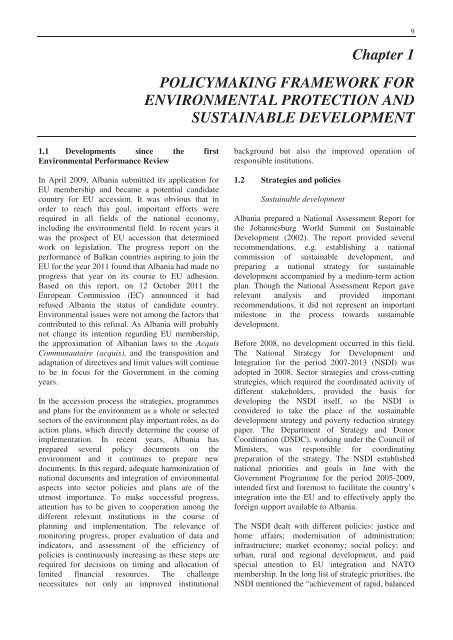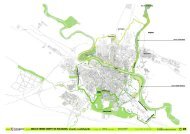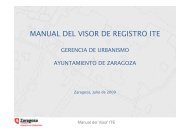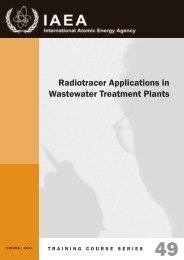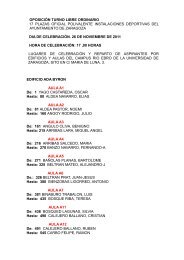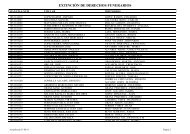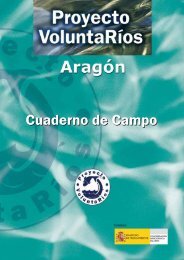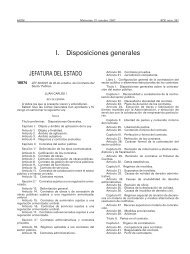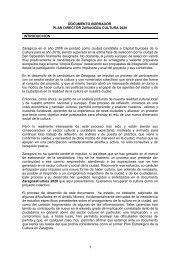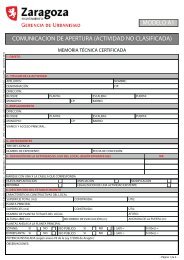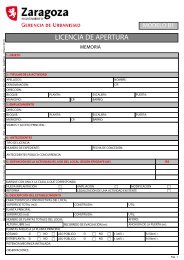Second Environmental Performance Review of Albania
Second Environmental Performance Review of Albania
Second Environmental Performance Review of Albania
You also want an ePaper? Increase the reach of your titles
YUMPU automatically turns print PDFs into web optimized ePapers that Google loves.
9Chapter 1POLICYMAKING FRAMEWORK FORENVIRONMENTAL PROTECTION ANDSUSTAINABLE DEVELOPMENT1.1 Developments since the first background but also the improved operation <strong>of</strong><strong>Environmental</strong> <strong>Performance</strong> <strong>Review</strong>responsible institutions.In April 2009, <strong>Albania</strong> submitted its application forEU membership and became a potential candidatecountry for EU accession. It was obvious that inorder to reach this goal, important efforts wererequired in all fields <strong>of</strong> the national economy,including the environmental field. In recent years itwas the prospect <strong>of</strong> EU accession that determinedwork on legislation. The progress report on theperformance <strong>of</strong> Balkan countries aspiring to join theEU for the year 2011 found that <strong>Albania</strong> had made noprogress that year on its course to EU adhesion.Based on this report, on 12 October 2011 theEuropean Commission (EC) announced it hadrefused <strong>Albania</strong> the status <strong>of</strong> candidate country.<strong>Environmental</strong> issues were not among the factors thatcontributed to this refusal. As <strong>Albania</strong> will probablynot change its intention regarding EU membership,the approximation <strong>of</strong> <strong>Albania</strong>n laws to the AcquisCommunautaire (acquis), and the transposition andadaptation <strong>of</strong> directives and limit values will continueto be in focus for the Government in the comingyears.In the accession process the strategies, programmesand plans for the environment as a whole or selectedsectors <strong>of</strong> the environment play important roles, as doaction plans, which directly determine the course <strong>of</strong>implementation. In recent years, <strong>Albania</strong> hasprepared several policy documents on theenvironment and it continues to prepare newdocuments. In this regard, adequate harmonization <strong>of</strong>national documents and integration <strong>of</strong> environmentalaspects into sector policies and plans are <strong>of</strong> theutmost importance. To make successful progress,attention has to be given to cooperation among thedifferent relevant institutions in the course <strong>of</strong>planning and implementation. The relevance <strong>of</strong>monitoring progress, proper evaluation <strong>of</strong> data andindicators, and assessment <strong>of</strong> the efficiency <strong>of</strong>policies is continuously increasing as these steps arerequired for decisions on timing and allocation <strong>of</strong>limited financial resources. The challengenecessitates not only an improved institutional1.2 Strategies and policiesSustainable development<strong>Albania</strong> prepared a National Assessment Report forthe Johannesburg World Summit on SustainableDevelopment (2002). The report provided severalrecommendations, e.g. establishing a nationalcommission <strong>of</strong> sustainable development, andpreparing a national strategy for sustainabledevelopment accompanied by a medium-term actionplan. Though the National Assessment Report gaverelevant analysis and provided importantrecommendations, it did not represent an importantmilestone in the process towards sustainabledevelopment.Before 2008, no development occurred in this field.The National Strategy for Development andIntegration for the period 2007-2013 (NSDI) wasadopted in 2008. Sector strategies and cross-cuttingstrategies, which required the coordinated activity <strong>of</strong>different stakeholders, provided the basis fordeveloping the NSDI itself, so the NSDI isconsidered to take the place <strong>of</strong> the sustainabledevelopment strategy and poverty reduction strategypaper. The Department <strong>of</strong> Strategy and DonorCoordination (DSDC), working under the Council <strong>of</strong>Ministers, was responsible for coordinatingpreparation <strong>of</strong> the strategy. The NSDI establishednational priorities and goals in line with theGovernment Programme for the period 2005-2009,intended first and foremost to facilitate the country’sintegration into the EU and to effectively apply theforeign support available to <strong>Albania</strong>.The NSDI dealt with different policies: justice andhome affairs; modernisation <strong>of</strong> administration;infrastructure; market economy; social policy; andurban, rural and regional development, and paidspecial attention to EU integration and NATOmembership. In the long list <strong>of</strong> strategic priorities, theNSDI mentioned the “achievement <strong>of</strong> rapid, balanced


